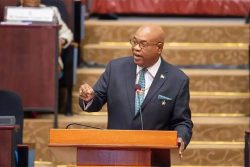SAO PAULO, (Reuters) – Brazil appears to have the best long-term prospects among rising economic powers, thanks to its stable policy framework, ample natural resources and good relationship with its neighbors, former U.S. President Bill Clinton said yesterday in a ringing endorsement of an economy that has struggled lately.
“If I were just sitting in a room betting on the future of rising countries, I’d bet on Brazil first,” Clinton said.
Brazil’s economy has been stagnant for the past year and is expected to grow only 1.7 percent in 2012 – less than half the projected average in Latin America. Some business leaders believe the country’s credit and commodities-led growth model has been nearly exhausted and are calling on the government to cut taxes and take other urgent steps to stimulate investment.
Clinton, speaking at a forum of bankers in S?o Paulo, acknowledged some problems but said Brazil still “looks really good” compared to crisis-ridden economies in Europe and the United States.
He said Brazil also compared favorably to India, which is struggling with a stagnant economic reform agenda, and China, which has tensions with some of its neighbors and is at risk of suffering from water scarcity and other depletion of natural resources, he said.
China “would kill to have the environmental problems you guys do,” Clinton told the mostly Brazilian audience. Clinton spoke alongside two other prominent leaders who also championed free markets and globalization during the 1990s – former British Prime Minister Tony Blair and Brazilian ex-President Fernando Henrique Cardoso.
Blair cited Brazil’s progress in reducing poverty and inequality over the past two decades, saying they were an inspiration for African countries where he has been spending his time lately — and also proof that liberal capitalism still works, despite the extended crises in the European Union and other rich nations.
Brazil has lifted more than 30 million people – or roughly 15 percent of its population – into the middle class during the past decade.
The most bearish of the speakers was Cardoso, who is widely credited with laying the groundwork for Brazil’s recent boom by getting rid of endemic inflation that peaked above 2,500 percent before he became president in 1995.
Cardoso, whose party is now in opposition, said President Dilma Rousseff and her predecessor, Luiz Inacio Lula da Silva, have relied too much on stimulating public and private-sector credit, while slipping on the fiscal rigor that helped his government establish Brazil’s credibility in global markets.
“There’s an impression that things are the same (as in the 1990s) but in reality there has been a lot of change,” Cardoso said.
The forum was held by investment bank Itau BBA, a unit of Itau Unibanco Holding, Brazil’s largest private-sector bank.








